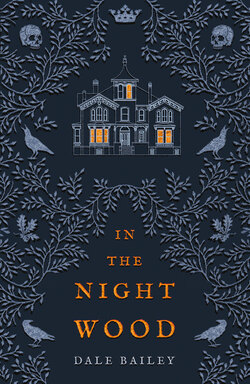Читать книгу In the Night Wood - Dale Bailey - Страница 24
1
ОглавлениеIt was haunted, of course, Hollow House.
But they were all haunted — Erin and Charles, Cillian Harris, Mrs. Ramsden, too. And though Mrs. Ramsden’s sins and failures and regrets, like those of Ann Merrow or Dr. Colbeck, have but glancing significance in this story, they were each of them protagonists in other tales, with their own dramas, their flights of joy, and their plunges into sorrow. Once upon a time: no life too humble, no event too insignificant.
Every story is a ghost story.
It was the photograph that haunted Erin and Charles, or, more precisely, the loss that it signified. A kindergarten photograph of a blonde girl, three-quarter profile, her hands crossed neatly upon the table in front of her, but otherwise unposed — her giggling smile (no doubt the photographer had ventured some joke), the soft curve of her jaw, her milky complexion — all this trapped behind a spider web of shattered glass.
For Erin, the photo was like a shallow well in a dry season. She dared not drink of it too often — yet she could not help herself. She drew it in her sketchbook time and again, laying out the lines of Lissa’s visage, lending it dimension and form with each careful stroke of her pencil. And then she would turn the picture to the wall and keep working, as if by this obsessive reproduction she could score the image into the tissue of her brain and heart. She would not forget her daughter’s face.
Already she could feel it slipping away.
For Charles the photo was like a jail, prisoning away the grief that could any moment escape to overwhelm him. As long as Lissa was locked behind the glass he could manage his days by rote — not unaffected, but functional at least. Erin feared forgetting. Charles longed for it. The burden of his sin (for so he thought of it) was too much to bear. Yet memory could not be contained. The shattered glass made the metaphor manifest. Looking at the photo now, he felt an inconsolable longing to go back, to start over and do everything right.
And Cillian Harris? Who could say? But he’d stiffened, like a man taking a small electric shock, when his gaze fell upon the photo that first day in the breakfast room. Briefly, to be sure — a breath, no more — but Charles had observed it nonetheless, and wondered.
The glass would have to be replaced, of course.
“I can’t look at her like this,” Erin said, too much reminded of the horrors of the day that Lissa had died. And now that Lissa had escaped, Charles had to lock her away once more.
He took the car and drove into Yarrow, to the hardware store he’d seen on the way to Hollow House. But Lissa had arrived before him. He saw her in a small child — was it her? — holding her mother’s hand as she leaned forward to smell the early spring flowers that bloomed in pots outside Petal Pushers. And worse yet, he saw her on the front page of the newspaper racked before the newsagent: the Ripon Gazette, the photograph unnerving, the headline worse: A FAMILY’S AGONY. He stepped inside, pressing his coins with tremulous fingers into the hand of a gruff man who barely acknowledged him, his eyes fixed on the television behind the counter.
Outside, in the bloodless English sunlight, Charles turned his attention to the paper:
The search continued for a missing six-year-old Tuesday near Yarrow. Mary Babbing was last seen riding her bicycle in front of her family home toward dusk last Sunday. Investigators —
Too much. Charles moved to discard the paper. He could not do so. Lissa stared up at him from the front page in lurid color. He folded it instead, tucked it under his arm, composed himself, blinking back tears.
Okay, then.
Mould’s hardware was next door.
